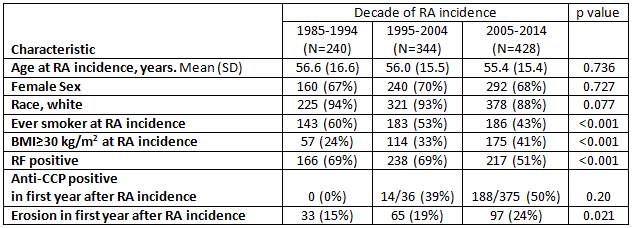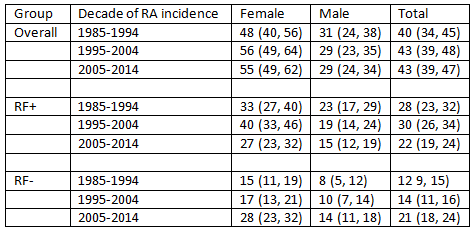Session Information
Session Type: Poster Session (Sunday)
Session Time: 9:00AM-11:00AM
Background/Purpose: The incidence and prevalence of rheumatoid arthritis (RA) vary substantially between populations in different geographic areas and over time. Recent trends in RA incidence in US populations are unknown. We aimed to examine trends in the incidence of RA from 2005 to 2014 as compared to the previous decades.
Methods: We evaluated RA incidence trends in a population-based inception cohort of individuals 18 years of age and older who first fulfilled the ACR 1987 classification criteria for RA between 1/1/1985 and 12/31/2014. While both rheumatoid factor (RF) and cyclic citrullinated peptide antibody (anti-CCP) were considered for criteria fulfillment when available, incidence rates were calculated for RF positive vs negative without inclusion of anti-CCP to allow fair comparison of incidence rates over 3 decades during which anti-CCP testing rates were on the rise. Incidence rates were estimated and were age-and sex-adjusted to the white population in the US in 2010. Trends in incidence rates were examined using Poisson regression methods.
Results: The 2005-2014 incidence cohort comprised 428 patients: mean age 55.4 years, 68% female, 51% RF positive, 50% anti-CCP positive (Table 1). There was no statistically significant difference in age at RA incidence, sex distribution or race in 2005-2014 cohort vs 1995-2004 and 1985-1994 cohorts. Smoking rates declined and obesity rates increased from earlier decades to more recent years. Patients in the 2005-2014 cohort were more likely to develop an erosion in the first year of RA incidence as compared to the previous decades.
Table 2 shows RA incidence rates per 100,000 population for 3 most recent decades and by RF status. The overall age- and sex-adjusted annual RA incidence in 2005-2014 was 43/100,000 population with age-adjusted incidence in women 55/100,000 population and 29/100,000 population in men. These estimates were similar to the 1995-2004 decade. There was a decline in the incidence of RF positive RA in 2005-2014 compared to the previous 2 decades (p=0.006), with a corresponding increase in RF negative cases (p< 0.001, Table 2).
Conclusion: The incidence of RA overall during the 2005-2014 period remained similar to the previous decade. An increase in RF-negative RA disease and decrease in RF positive RA was found using 1987 ACR criteria. Changing prevalence of environmental factors, such as smoking, obesity and others, may have contributed to these trends. Whether these trends represent a changing serological profile of RA requires further investigation.
To cite this abstract in AMA style:
Myasoedova E, Davis J, Matteson E, Crowson C. Is the Epidemiology of Rheumatoid Arthritis (RA) Changing? Results from a Population-based Incidence Cohort of RA Patients, 2005-2014 [abstract]. Arthritis Rheumatol. 2019; 71 (suppl 10). https://acrabstracts.org/abstract/is-the-epidemiology-of-rheumatoid-arthritis-ra-changing-results-from-a-population-based-incidence-cohort-of-ra-patients-2005-2014/. Accessed .« Back to 2019 ACR/ARP Annual Meeting
ACR Meeting Abstracts - https://acrabstracts.org/abstract/is-the-epidemiology-of-rheumatoid-arthritis-ra-changing-results-from-a-population-based-incidence-cohort-of-ra-patients-2005-2014/


